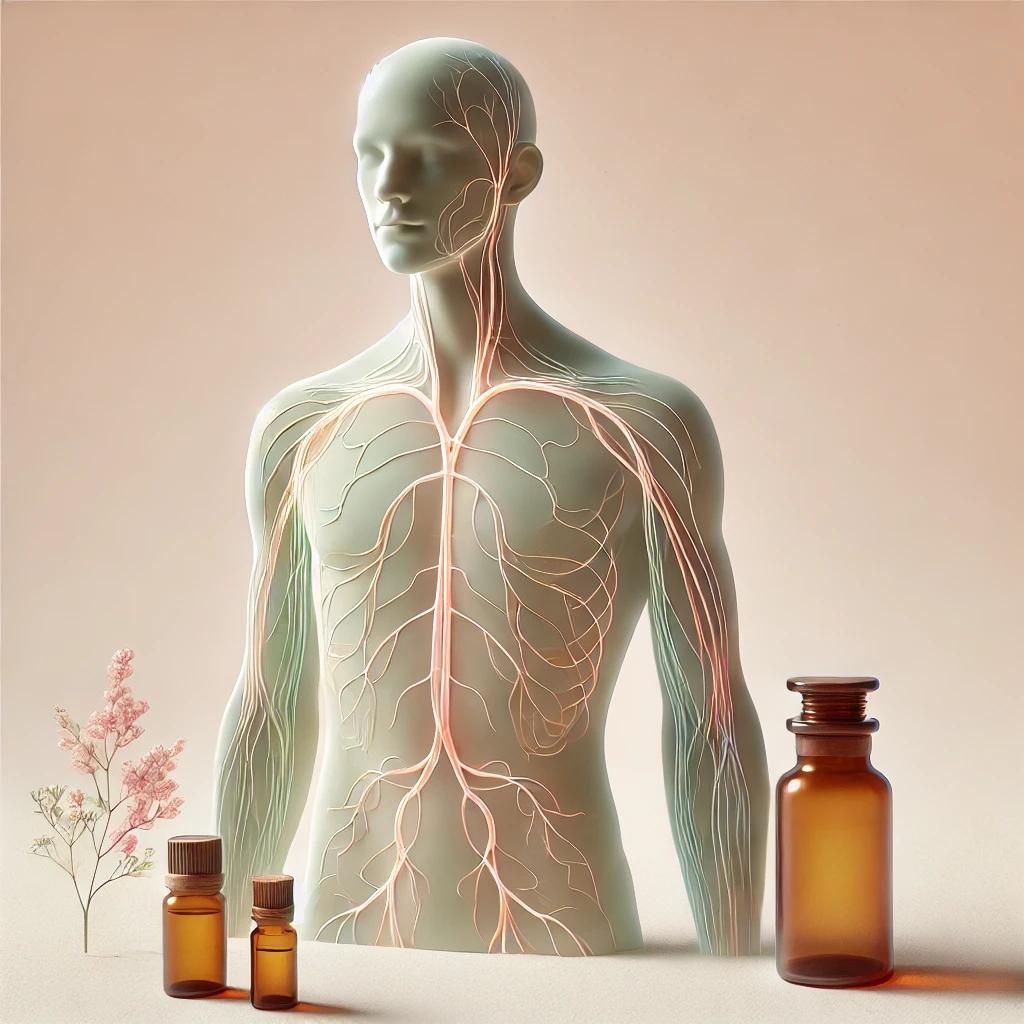Endometriosis is a chronic condition where tissue similar to the lining of the uterus grows outside the uterus, causing pain and potentially leading to fertility issues. Managing symptoms often requires a multifaceted approach. Essential oils, known for their therapeutic properties, are increasingly popular as a complementary treatment to help alleviate symptoms of endometriosis. In this guide, we’ll explore the benefits, usage, and safety tips for using essential oils to support those with endometriosis.
What are the best essential oils for endometriosis?
Essential oils are potent plant extracts known for their therapeutic properties. When it comes to endometriosis, certain essential oils stand out for their ability to alleviate pain, reduce inflammation, and promote relaxation. Here are some of the best essential oils for managing endometriosis symptoms:
- Lavender: Renowned for its calming and pain-relieving properties.
- Clary Sage: Known to balance hormones and reduce menstrual pain.
- Frankincense: Helps reduce inflammation and promotes relaxation.
- Geranium: Balances hormones and alleviates pain.
- Peppermint: Provides a cooling effect and helps with pain relief.
- Ginger: Known for its anti-inflammatory properties.
- Rosemary: Reduces pain and inflammation.
- Eucalyptus: Helps reduce inflammation and pain.
These essential oils can be used individually or in blends to maximize their benefits for endometriosis.

How do essential oils help with endometriosis pain?
Essential oils can significantly help manage endometriosis pain through their various properties and applications. Here are some ways in which they provide relief:
- Anti-inflammatory Properties: Oils like ginger and frankincense reduce inflammation, a key factor in endometriosis pain.
- Analgesic Effects: Lavender and peppermint oils have natural pain-relieving properties.
- Hormone Balancing: Clary sage and geranium help balance hormones, reducing menstrual cramps.
- Muscle Relaxation: Eucalyptus and lavender oils can relax the muscles, alleviating pain.
- Stress Reduction: Many essential oils, including lavender and frankincense, promote relaxation and reduce stress, which can exacerbate pain.
Table: Benefits of Essential Oils for Endometriosis Pain
| Essential Oil | Key Benefits |
|---|---|
| Lavender | Pain relief, relaxation |
| Clary Sage | Hormone balance, menstrual pain relief |
| Frankincense | Inflammation reduction, relaxation |
| Geranium | Hormone balance, pain relief |
| Peppermint | Cooling effect, pain relief |
| Ginger | Anti-inflammatory |
| Rosemary | Pain and inflammation reduction |
| Eucalyptus | Inflammation reduction, muscle relaxation |
These oils can be applied topically (diluted with a carrier oil), used in a diffuser, or added to a warm bath for maximum benefit.
What are the safety tips for using essential oils for endometriosis?
When using essential oils for endometriosis, safety is paramount. Here are some crucial tips to ensure safe and effective use:
- Dilution: Always dilute essential oils with a carrier oil (like coconut or jojoba oil) before applying them to the skin to prevent irritation.
- Patch Test: Conduct a patch test on a small area of skin to check for any allergic reactions.
- Dosage: Use only a few drops of essential oil to avoid overuse, which can lead to adverse effects.
- Quality: Choose high-quality, pure essential oils from reputable brands to ensure their efficacy and safety.
- Consultation: If pregnant, nursing, or under medical supervision, consult a healthcare professional before using essential oils.
- Storage: Store essential oils in a cool, dark place to preserve their potency.
- Avoid Ingestion: Do not ingest essential oils unless under the guidance of a qualified aromatherapist or healthcare provider.
- Sensitive Areas: Avoid applying essential oils to sensitive areas like the eyes and mucous membranes.
- Children: Keep essential oils out of reach of children and use with caution on young skin.
- Photosensitivity: Be aware that some oils, like citrus oils, can cause photosensitivity and should be avoided before sun exposure.
By following these safety tips, you can effectively and safely incorporate essential oils into your endometriosis management routine.
How to use essential oils for endometriosis?
There are several effective ways to use essential oils to manage endometriosis symptoms. Here are some methods to consider:
- Topical Application: Dilute essential oils with a carrier oil and massage onto the lower abdomen, lower back, or other areas of pain.
- Aromatherapy: Use a diffuser to inhale the aroma of essential oils, promoting relaxation and pain relief.
- Warm Bath: Add a few drops of essential oil to a warm bath to help relax muscles and reduce pain.
- Compress: Create a warm or cold compress by adding essential oils to water, soaking a cloth, and applying it to the painful area.
- Inhalation: Directly inhale essential oils from the bottle or add a few drops to a tissue and breathe deeply.
- Personal Inhaler: Use a personal inhaler to carry your essential oil blend for on-the-go relief.
- Roller Bottle: Create a roller bottle blend for easy application on the go.
- Massage: Incorporate essential oils into a full-body massage to reduce overall stress and pain.
- Diffuser Necklace: Use a diffuser necklace to carry the benefits of essential oils with you throughout the day.
- Room Spray: Make a room spray with essential oils to create a calming environment at home.
By utilizing these methods, you can tailor your essential oil usage to best suit your needs and preferences.
Can essential oils reduce inflammation associated with endometriosis?
Yes, essential oils can play a significant role in reducing inflammation associated with endometriosis. Inflammation is a major factor in the pain and discomfort caused by this condition. Here’s how specific essential oils can help:
- Ginger: Known for its potent anti-inflammatory properties.
- Frankincense: Reduces inflammation and promotes overall well-being.
- Eucalyptus: Has anti-inflammatory and pain-relieving properties.
- Turmeric: Contains curcumin, which is known for its anti-inflammatory effects.
- Rosemary: Helps reduce swelling and pain associated with inflammation.
Table: Anti-inflammatory Essential Oils
| Essential Oil | Anti-inflammatory Properties |
|---|---|
| Ginger | Potent anti-inflammatory effects |
| Frankincense | Reduces inflammation and promotes well-being |
| Eucalyptus | Anti-inflammatory and pain-relieving |
| Turmeric | Contains curcumin, reduces inflammation |
| Rosemary | Reduces swelling and pain |
These essential oils can be used topically, inhaled, or added to baths to help manage inflammation effectively.
What essential oil blends are effective for endometriosis?
Creating blends of essential oils can enhance their therapeutic effects. Here are some effective blends for managing endometriosis symptoms:
- Pain Relief Blend:
- 4 drops Lavender
- 3 drops Clary Sage
- 2 drops Peppermint
- Dilute in 10 ml of carrier oil
- Hormone Balance Blend:
- 3 drops Geranium
- 3 drops Clary Sage
- 3 drops Frankincense
- Dilute in 10 ml of carrier oil
- Anti-inflammatory Blend:
- 3 drops Ginger
- 3 drops Eucalyptus
- 3 drops Turmeric
- Dilute in 10 ml of carrier oil
- Relaxation Blend:
- 4 drops Lavender
- 3 drops Frankincense
- 2 drops Geranium
- Dilute in 10 ml of carrier oil
- Stress Relief Blend:
- 3 drops Lavender
- 3 drops Frankincense
- 3 drops Bergamot
- Dilute in 10 ml of carrier oil
These blends can be used in diffusers, applied topically, or added to baths to provide relief from endometriosis symptoms.
Are there any essential oils to avoid with endometriosis?
While many essential oils can be beneficial, some may not be suitable for those with endometriosis. Here are a few to be cautious about:
- Fennel: Can mimic estrogen and potentially disrupt hormone balance.
- Anise: Contains compounds that may affect hormone levels.
- Sage (common sage, not clary sage): Can influence hormones and should be used with caution.
- Cinnamon: Highly potent and can cause skin irritation if not properly diluted.
- Wintergreen: Contains methyl salicylate, which can be toxic in high doses.
Table: Essential Oils to Avoid
| Essential Oil | Reason for Avoidance |
|---|---|
| Fennel | Mimics estrogen, disrupts hormone balance |
| Anise | Affects hormone levels |
| Sage | Influences hormones, use with caution |
| Cinnamon | Can cause skin irritation |
| Wintergreen | Contains methyl salicylate, potentially toxic |
By being aware of these oils, you can avoid potential adverse effects and use essential oils more safely.
How often should you use essential oils for endometriosis relief?
The frequency of essential oil use for endometriosis relief depends on individual needs and responses. Here are some general guidelines:
- Daily Use: For ongoing support, use essential oils daily in a diffuser or as a part of your skincare routine.
- During Pain Episodes: Apply topically (diluted) or use a compress up to three times a day during periods of intense pain.
- Baths: Add essential oils to a warm bath 2-3 times a week for relaxation and pain relief.
- Massage: Incorporate essential oils into a weekly massage routine.
- Inhalation: Use a personal inhaler or diffuser necklace daily for continuous relief.
- Roller Bottles: Apply blends from roller bottles as needed throughout the day.
Monitoring your body’s response is key. Adjust the frequency based on how your symptoms respond to the treatment.
Can essential oils improve mood and reduce stress related to endometriosis?
Absolutely, essential oils are well-known for their ability to enhance mood and reduce stress, which is particularly beneficial for those managing endometriosis. Stress can exacerbate pain and other symptoms, so managing it is crucial. Here’s how essential oils can help:
- Lavender: Promotes relaxation and reduces anxiety.
- Frankincense: Calms the mind and reduces stress.
- Bergamot: Uplifts mood and relieves stress.
- Ylang Ylang: Enhances mood and promotes relaxation.
- Rose: Provides a calming effect and reduces stress.
List: Essential Oils for Mood Improvement and Stress Reduction
- Lavender: Promotes relaxation and reduces anxiety.
- Frankincense: Calms the mind and reduces stress.
- Bergamot: Uplifts mood and relieves stress.
- Ylang Ylang: Enhances mood and promotes relaxation.
- Rose: Provides a calming effect and reduces stress.
By incorporating these oils into your daily routine, you can manage stress and improve your overall mood.
What other natural remedies can complement essential oils for endometriosis?
In addition to essential oils, several natural remedies can help manage endometriosis symptoms. Here are some to consider:
- Diet: Focus on anti-inflammatory foods like leafy greens, berries, and fatty fish.
- Supplements: Consider omega-3 fatty acids, magnesium, and turmeric supplements.
- Exercise: Regular physical activity can reduce pain and improve overall well-being.
- Heat Therapy: Use heating pads or warm baths to alleviate pain.
- Acupuncture: Can help reduce pain and improve overall health.
- Herbal Remedies: Herbs like chamomile and ginger can be beneficial.
- Yoga and Meditation: Promote relaxation and stress reduction.
- Hydration: Stay well-hydrated to support overall health.
- Sleep: Ensure adequate rest to help the body heal and manage stress.
- Mindfulness Practices: Incorporate mindfulness and relaxation techniques into your routine.
By combining these natural remedies with essential oils, you can create a holistic approach to managing endometriosis.
Conclusion
Essential oils offer a natural and effective way to manage the symptoms of endometriosis, from reducing pain and inflammation to balancing hormones and improving mood. By understanding the best oils to use, how to use them safely, and integrating them with other natural remedies, you can create a comprehensive approach to support your well-being. Always consult with a healthcare professional before starting any new treatment, especially if you have underlying health conditions or are taking medications. Embrace the benefits of essential oils to enhance your quality of life and manage endometriosis more effectively.



